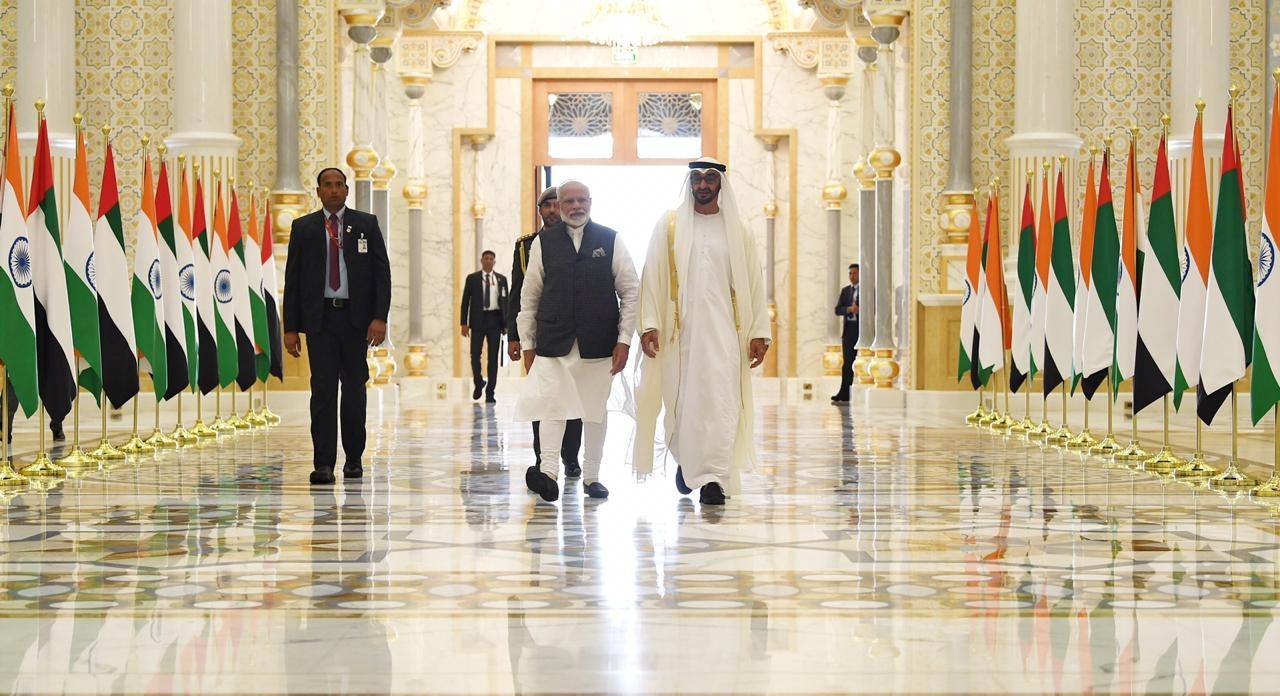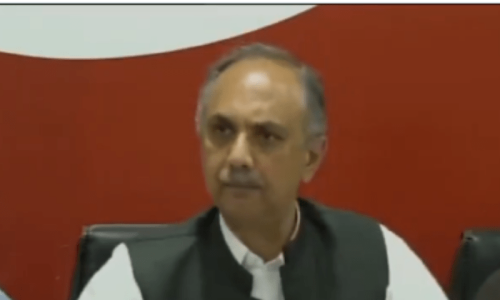Modi awarded UAE highest civilian honour amid occupied Kashmir crackdown

Indian Prime Minister Narendra Modi received the United Arab Emirates’ highest civilian honour during a visit on Saturday to the oil-rich Gulf nation, reinforcing ties between the countries even as he faces criticism over stripping occupied Kashmir of its autonomy.
The induction of Modi into the Order of Zayed shows the importance the UAE places on India, the world’s third-largest consumer of crude oil. India is home to a rapidly growing consumer market and labor pool that the federation of sheikhdoms relies on for its own economy.
Activists, however, decried the UAE bestowing the award on Modi as he pursues a clampdown on the Himalayan region, saying it only gives cover to India amid the Kashmir crackdown.
“With several Gulf states in an ever-tightening embrace with Modi, human rights have been discarded in favour of economic opportunities,” wrote Samah Hadid, a Beirut-based human rights advocate.
“India has not only escaped international condemnation for its actions, it is even shoring up support from Muslim allies,” said Hadid. “The plight of Kashmiris will not only be silenced by India’s clampdown but also the apathy of those who long claimed to speak for them.”
Hours after the UAE awarded Narendra Modi its highest civilian honour, Senate Chairman Sadiq Sanjrani cancelled a scheduled visit to the Gulf nation.
According to an announcement issued by the Senate secretariat, the chairman decided to cancel his trip in the backdrop of Modi's recent visit to the UAE.
"Pakistan strongly supports the freedom movement of Kashmiri people, while the Modi government is subjecting Kashmiri Muslims to extreme oppression and a curfew is imposed [in the occupied Kashmir]," read the statement.
"Under the given circumstances, a visit to the UAE would hurt the sentiments of Kashmiri mothers, sisters and old people. So, the chairman cancelled the visit of a parliamentary delegation, led by him," it added.
Modi is also to travel to Bahrain to become the first Indian premier to visit the island nation.
Abu Dhabi’s powerful crown prince, Sheikh Mohammed bin Zayed Al Nahyan, personally put the golden medal around Modi’s neck during an event that was closed to press in Abu Dhabi, the Emirati capital. With a portrait of Sheikh Zayed bin Sultan Al Nahyan, the UAE’s first president for whom the order is named, behind them, the two men shook and held hands for a moment and spoke quietly.
“You deserve it,” Sheikh Mohammed told Modi at one point while posing for photos.
Modi had been announced as a recipient of the prize in April in a tweet from Sheikh Mohammed.
“We have historical and comprehensive strategic ties with India, reinforced by the pivotal role of my dear friend, Prime Minister Narendra Modi, who gave these relations a big boost,” a tweet from his account read.
Sheikh Mohammed’s announcement came just before Modi won re-election. Their interaction on Twitter and elsewhere shows the personal relationship the two men have forged, said Abdulkhaleq Abdulla, an Emirati political science professor.
“We’ve never had it like this before,” Abdulla said. “From there, everything circles down.”
Related: Modi breaks protocol to greet UAE Crown Prince at airport
Even without the personal touch, India has for decades been a major point of trade for the Emirates, from trade routes to gold smuggling.
Some 3.1 million Indians now call the UAE home alone, ranging from labourers to multimillionaires, according to Indian government statistics. By comparison, estimates suggest there are only around 1 million Emiratis living in the country of over 9 million.
Across the wider Gulf Cooperation Council, which includes six Gulf Arab nations, there are 8.5 million Indians. They send billions of dollars a year in remittances back home.
That, coupled with cooperation on political and defense matters, makes India ever-more important for the UAE and other Gulf Arab states.
“Countries like India cannot be taken for granted anymore,” said Kabir Taneja, an associate fellow at the New Delhi-based Observer Research Foundation think tank.
The timing of the award, however, comes amid Modi’s push in occupied Jammu and Kashmir.
On August 5, Modi’s government revoked a decades-old special status granted to occupied Kashmir and deployed thousands of troops the region. Indian-occupied Kashmir has been under a sweeping military curfew since then that has seen thousands detained and residents cut off from all communication and the internet.
Read: Kashmiris defy curbs, clash with Indian forces
Although Modi’s decision affects Muslims living in Indian-occupied Kashmir, the move has drawn a largely muted response from Gulf Arab nations. The UAE’s ambassador to India in particular referred to Kashmir as an internal issue for India.
While calling the timing of the award “awkward”, Abdulla, the Emirati professor, said it made sense for the UAE to honour its promise to give Modi the Order of Zayed.
“No matter what you do, no matter one way or the other, there’s going to be people who criticise it,” he said.
Others, like British parliamentarian Naz Shah from the Labour party, see it far differently. She published an open letter addressed to Sheikh Mohammed asking him to reconsider giving the award due to the “brutality” she described Modi as directing.
“I ask you to question this decision and reconsider giving such an award, not only because the majority of the Kashmiri people share the same faith as you, but because we have a duty as human beings to stand up against the disregard of human rights and evil,” Shah wrote.















































